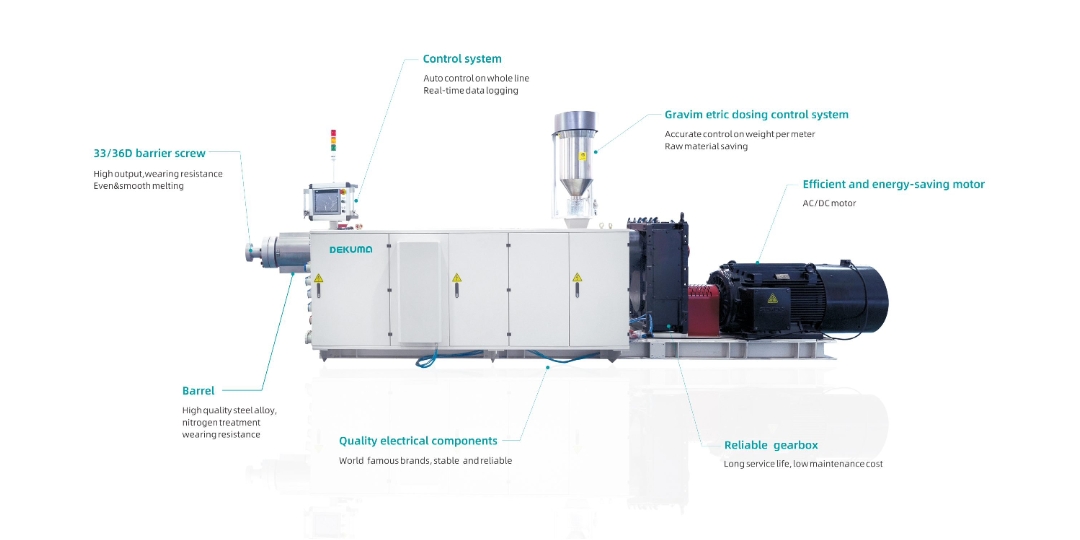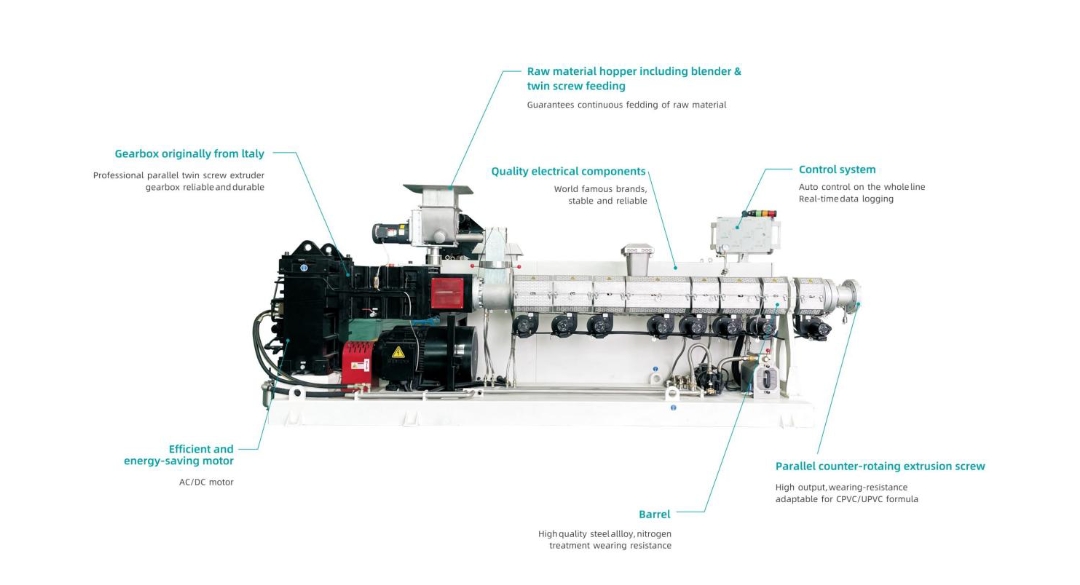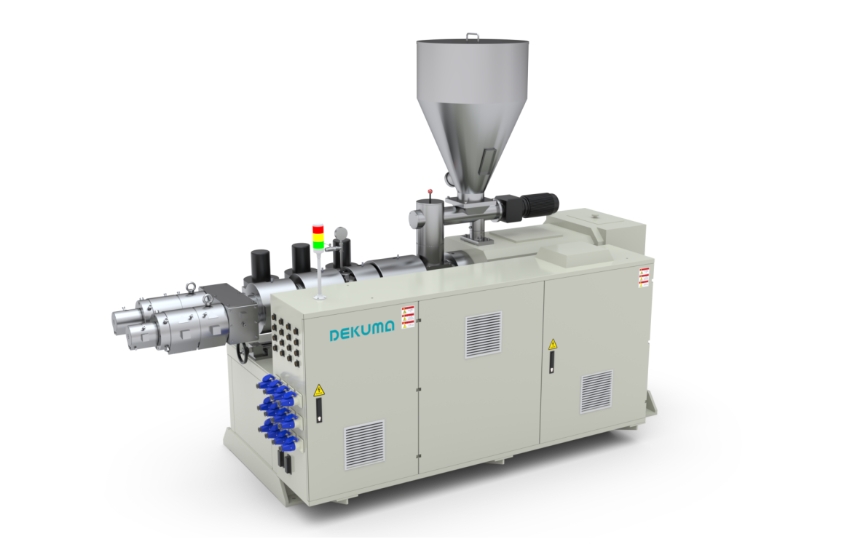PVC piping plays an essential role in today’s infrastructure, supporting critical systems in construction, plumbing, agriculture, and beyond. Behind each PVC pipe is a production system built for precision and speed.
At the center of that system is the PVC pipe extrusion process, where raw material is transformed into reliable, high-performance piping. The pipe extruder, which is key in the whole PVC pipe extrusion process, drives this process. It feeds, melts, and conveys the PVC compound under controlled heat and pressure.
There’s more to explore in this critical machinery, and this article will guide you through the basics to essential factors, helping you to find the right pipe extruder.
Picture shown: Twin Screw Extruder in a PVC Pipe Extrusion Line
Understand the Basics of PVC Pipe Extrusion
The PVC pipe extrusion process runs continuously, converting blended or pelletized PVC into finished pipes with consistent shape, structure, and mechanical performance.
The process begins by feeding the raw material into the extruder through a hopper. Inside the barrel, a screw rotates to convey the material forward.
As the material moves along the screw channel, it is subjected to external heating from the barrel heaters as well as internal heat generated by friction and shear forces caused by the screw rotation. This combined heat gradually melts and plasticizes the PVC compound.
The screw performs multiple functions simultaneously: it transports, compresses, mixes, and melts the material to achieve a uniform molten state. Once fully plasticized, the molten material is forced through a screen pack to filter out impurities and then pushed through a shaping die to form the desired pipe profile.
After extrusion, the pipe passes through a cooling system to solidify and maintain its shape before being cut to length for further processing or shipment.
Key Factors to Consider Before Choosing an Extruder
After learning the PVC pipe extrusion process, you may understand there are different components that contribute to the smooth performance of the extrusion machine. Then, to make sure your investment runs properly and efficiently, what should you consider before buying?
Keep the following things in mind:
- Desired Output Capacity
Every production facility operates with specific volume targets. The extruder must match those goals without straining the system or reducing melt consistency. If the extruder is too small, you will face production bottlenecks. If it is too large, it can lead to excessive power use and higher material waste.
- PVC Compound Formulation
PVC compounds vary in structure. Some contain stabilizers, fillers, or plasticizers that require specific thermal and shear conditions. An extruder must be chosen based on how well it can process the exact formulation without causing burn marks, gel formation, or inconsistent melting.
- Pipe Dimensions and Complexity
The size and structure of the pipe directly influence extruder requirements. Producing large-diameter pipes or thick-wall profiles requires greater torque, precise melt control, and a stable extrusion rate. Complex designs, such as multilayer pipes or corrugated structures, add further processing challenges.
The PVC pipe extrusion machine must be capable of maintaining stable parameters under these heavy loads and complex conditions to ensure PVC pipe quality and continuous production.
- Budget and Long-Term Costs
The initial price alone should not guide your buying decision. Energy consumption, machine durability, availability of parts, and maintenance frequency all affect the total cost over time. A slightly higher investment in a reliable extruder often pays off through reduced downtime and lower repair needs.
Single vs. Twin Screw Extruders: Which to Choose?
This is one of the most important decisions in configuring a PVC pipe extrusion line. Single-screw extruders are widely used for standard applications. They are simpler to operate, cost less upfront, and perform well with consistent PVC formulations. For many basic pipe types, they offer reliable results with minimal complexity.

Picture shown: Single Screw Pipe Extruder
Twin screw extruders, on the other hand, are designed for more demanding tasks. They provide better mixing, more uniform melting, and greater control over shear and temperature. These features make them a better fit for rigid compounds, filled formulations, or PVC pipe production lines requiring high output and tighter tolerances. Although they come with a higher investment, the added performance and flexibility justify the cost in advanced manufacturing setups.

Picture shown: Twin Screw Pipe Extruder
Where to Have Reliable PVC Pipe Extrusion Machines?
If you are looking for a trustworthy pipe extruder manufacturer, Dekuma is a proven name in combining over 40 years of experience with German engineering standards. Their PVC pipe extrusion machines are designed for stable, high-efficiency performance and are trusted by manufacturers across Europe, the Americas, the Middle East, and Asia.
Their single-screw extruders offer consistent output, smart automation through PLC systems, and easy integration into existing lines. For more demanding applications, Dekuma’s twin-screw extruders provide enhanced mixing, low energy consumption, and excellent melt quality, even with filled or rigid PVC compounds.
You can trust that their machines are built under strict technical supervision using high-grade components. Furthermore, the brand offers professional custom expertise for manufacturing the right pipe extruder machine for specific manufacturing needs.
Wrapping Up
Choosing the right extruder is key to running a stable and efficient PVC pipe extrusion line. Dekuma stands out with its proven engineering, reliable performance, and custom-built solutions for a wide range of pipe types and materials. With decades of experience and global trust, Dekuma offers the tools and support manufacturers need to stay competitive.
For more information about their pipe extruder machines or comprehensive pipe extrusion lines, you may click here to contact Dekuma!





























